Leave it to Sir Tim Berners-Lee, none other than the inventor of the World Wide Web, to deliver the coda for True North 2019, the two-day conference about tech for good:
“Whatever it is that you do, think globally, act locally – think about tech for good,” he said. Think, Berners-Lee added, about making “your true north, your direction, about fixing democracy and fixing climate change.”
Big problems. Problems in need of big solutions. And big conversations to get there – about making a difference.
True North 2019, the follow-on from last year’s ground-breaking debut gathering, was about three major themes: the age of re-learning; living digital; building bridges, not walls.
For two days delegates at Kitchener’s massive and inspiring Lot42 Global Flex campus heard from a kaleidoscope of doers and thinkers committed to finding a way to make sure technology delivers on its potential to make the world better, more humane, more functional.
It witnessed the launch of the problem statement for the $1-million Leaders Prize at True North – which will address the scourge of fake news. It heard, on Wednesday, from award-winning journalist and author Thomas Friedman, who led the room on a gripping journey highlighting technology’s ills and, perhaps, its salvation – community.
It heard about killer robots. It heard about work that ordinary people and well-intentioned companies are doing to make lives and technology better.
“This has been a remarkable gathering,” said Iain Klugman, CEO and President of Communitech, the event host. “We urge you to carry on the conversations that you’ve had here today.”
To that end, Berners-Lee, the event’s closing speaker, and whose ideas and work have changed the way the planet communicates and operates, provided a fitting finale.
Berners-Lee began his discussion by freely acknowledging his own role, and the web’s role, in unintentionally fostering many of technology’s problems.
And he talked about the work he’s doing to set things right – decentralization. Giving people control over their data.
“Who would have thought that there were so many things to worry about?” he said.
“I want to talk about positive things.”
Thursday happened to also be World Refugee Day, and what more appropriate way to acknowledge it than the moving story delivered by Kris Braun, who led off the day by describing the way his company, Bonfire, recently created headlines by helping welcome, resettle and employ a Syrian refugee by the name of Mohammed Hakmi. Bonfire’s decision has paved the way for others to follow and has inspired more companies – including Waterloo Region firms like SkyWatch and Arctic Wolf – to do the same.
From there, it was Megan Smith, former vice-president at Google and former chief technology officer for the United States under both the Obama and Trump administrations.
Smith led the audience on a rapid-fire rundown of the myriad ways technology is linking people around the world and solving meaningful problems – and the things we can do better. She spoke about “uncropping history” to reveal the important contributions of women and minorities. And she spoke about finding ways to make education better in order to preserve curiosity and keep talented people engaged.
“We teach science and technology in a brutal way,” Smith said. “We make [students] bored. We can make school not boring,” and in so doing expand the pool of people solving problems with technology.
“We really drive up the confidence of some people and damage the confidence of others. We need everybody at the table.”
Smith then took part in a panel discussion about improving delivery of government services with two of her former colleagues: the Province of Ontario’s Chief Digital Officer, Hillary Hartley and Hartley’s counterpart with the federal government, Aaron Snow, CEO of the Canadian Digital Service.
Tobi Lütke, CEO of the rapidly growing e-commerce giant Shopify, then took a seat on Stage A with the CBC’s Rosemary Barton, who led a one-on-one session one day after Shopify announced it was going to spend $1 billion in order to take on Amazon and ultimately offer its clients two-day shipping of their products to within 99 per cent of the U.S.
“A lot of companies talk about risk-taking but not a lot … do it,” Lütke said.
Lütke, who came to Canada from Germany and launched Shopify in the wake of attempting to start up an online snowboard company, said that Canada is “an incredible place to start” a company.
“There are challenges, but I think Canada is one of the most optimistic places on the planet.”
But he added a note of caution, one he said was identified by Prime Minister Justin Trudeau during a recent joint appearance:
“[What] Canada is missing is a swagger of its accomplishments. There’s a bit of a go-for-bronze mentality in Canada.”
Next, Rizwan Khalfan, the Executive Vice-President and Chief Digital and Payments Officer at the TD Bank Group – TD is one of True North’s chief sponsors and maintains a corporate innovation lab at Communitech – outlined the work his company has done to corral the problem of spiralling debt and out-of-control spending. “Seventy-nine per cent of Canadians do not feel confident about their financial future,” Khalfan said.
TD’s answer? An easy-to-use app that allows customers to see and track what they spend.
“What we saw was amazing. To our amazement, the first cohort that used [the app the most] reduced their spend by eight per cent.”
The control group, those who didn’t use the app, saw their spending increase.
The morning session on Stage A was closed out by Cynthia Goh, a professor of chemistry at the Munk School of Global Affairs at the University of Toronto, who talked about the 1.2 billion people in the world who live without electric light, and the ensuing negative impact on productivity, education and security.
Plenty of activity unfolded throughout the Lot42 venue, and there was plenty of good advice on offer, too. Such as:
Practise security hygiene. Don’t recycle passwords. Get your CEO to think about security.
These were some of the lessons learned during a morning tabletop simulation of a ransomware attack on a fictional company, conducted at a University of Waterloo-hosted workshop: All Hands on Deck for a Security Incident.
One of the hosts, Michele Mosca, co-founder and deputy director of the University of Waterloo Institute for Quantum Computing, said, “We moved so much of our lives and economy into cyberspace without understanding the consequences.” The consequences were made abundantly clear in the nearly 90-minute session.
Simulation leader John Svazic, Information Security Manager for Auvik Networks, offered the crowd a “pro tip”: “If you don’t have a plan, run one of these — you’ll build a plan.”
Thursday morning on Stage B began with a focus on the age of re-learning, a theme Communitech explored this year during its future of work series, which aimed to position Waterloo Region as a test bed for ideas to address workers displaced by automation.
“Right now everything is changing but this is probably the slowest things are ever going to change again,” said Jeremy Auger, Chief Strategy Officer at D2L.
Other Stage B highlights:
- Knowledgehook’s Travis Ratnam detailed how the Kitchener-based software company is using data to help identify where teachers need support when it comes to educating kids in math.
- Sarah Prevette, CEO of Toronto-based Future Design School, noted 65 per cent of primary school kids will have jobs that don’t yet exist. “All of a sudden we have to prepare students for a brave new world where they’ll have to figure out their own employment,” she said.
- Hamoon Ekhtiari, CEO of FutureFit AI, a platform to reskill workers, argued the future isn’t just about developing people for jobs that are growing because a job is part of a person’s identity. “Humans are not widgets,” he said.
- Waterloo-based Chalk’s CEO William Zhou said we’re heading into the fourth industrial revolution, which is digitization and data. AI and tech will displace jobs, but will create new ones too, he said. “We need a reskilling revolution.” That means focusing on human skills, such as storytelling and collaboration.
- Plum.io CEO Caitlin MacGregor encouraged everyone in the audience to take the HR company’s survey so they’ll know what their top talents are and how to leverage them in the workplace. When we focus on how to use people’s talents, we have career lattices instead of career ladders, she said.
- Bonfire Interactive’s Megan Wahab and Liu Yang challenged makers to think about how the products they build will displace their users. They issued a call to action: when designing for users, think about the user’s purpose in order to elevate, rather than displace, them.
- Krystyn Harrison, founder of digital coaching service Prosper, wrapped up Stage B by arguing that businesses are underinvesting in skills, such as creativity, collaboration, and critical thinking, that will future proof their companies. “Soft skills have actually become the hard skills,” she said.
The afternoon on Stage A opened with Google engineer Komal Singh, who talked about her children’s book Ara the Star Engineer. The book was Singh’s counter-narrative response to her four-year-old daughter announcing that, “Engineers are boys.”
Singh was followed by a panel of four women – Catherine McIntyre, Rakhi Tripathi, Catrena Norris Carter and Sue Britton – addressing the forces that spawned the #MeToo movement.
“With or without technology there is such a prevalence of bad behaviour,” said Britton, CEO and founder of Toronto-based FinTech Growth Syndicate.
“It’s not exclusive about gender, but a lot of it is about gender.
“Why is it so hard to deal with this?”
Added Norris Carter, the founder and President of Women United Now Inc., an advocacy group based in Washington, D.C., “Sometimes we need to shame these big companies and hold them accountable.
“I wish everyone knew their own power. The power of one.”
Next, Matthew Chandy described the efforts of his team to give more power to youth and children in Waterloo Region. Chandy spearheaded Smart Waterloo Region, the region’s entry into a federal government’s Smart Cities Challenge, which concluded last May. Waterloo Region didn’t win the challenge, but Chandy described the legacy that his team achieved, including raising more than $35 million in cash, $65 million in in-kind contributions, and connections with the local tech community and UNICEF Canada, all of which will serve as a blueprint to improve lives for children and youth not only in Waterloo Region, but across Canada.
Meanwhile, 60 participants at a workshop jointly sponsored by the TD Bank Group and the Accelerator Centre explored whether Waterloo Region could become Canada’s first carbon-neutral community. If so, what would that look like? How would it get there?
Academics, municipal officials, engineers and planners worked through an ideation process and considered everything from how apartment dwellers can access composting facilities to a “no empty trucks” approach to package delivery.
Tova Davidson, executive director of Sustainable Waterloo Region, highlighted some of the challenges, noting that as Waterloo Region’s population has grown, so has its car ownership, at double the rate of the population growth. Transportation accounts for 49 per cent of the greenhouse gas creation in Waterloo Region. Having said that, there were only 70 electric cars in Waterloo Region in 2013, but that grew to 1,478 by 2018. Still, she noted, there is much to do: “This is the moment. We are standing at the precipice. We don’t have any more time.”
That theme – that action is needed now – infused True North 2019 and set a tone of roll-up-your-sleeves.
“We need to enable science, ” said Berners-Lee.
“We need to fix democracy.
“Academics and coders, geeks and investors, talking about doing things for good.
“Right now. This year. Right now. This conference.”
True North 2019 was sponsored by Manulife, TD, Wilfrid Laurier University, Deloitte and University of Waterloo.
– with files from Bill Bean and Kelly Pedro
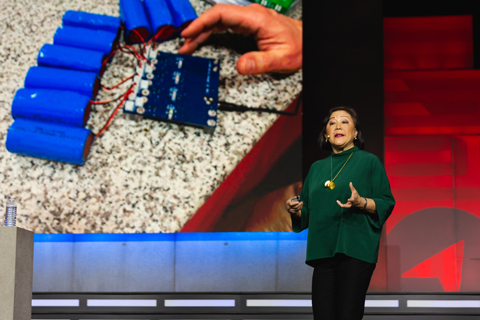
Cynthia Goh talks about the 1.2 billion people in the world who live without electric light, and the resulting negative impacts. (Communitech photo: Harminder Phull)
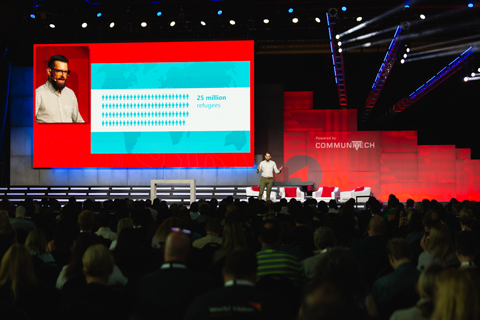
Kris Braun of Bonfire delivers an address on how skilled refugees can help fill Waterloo Region’s tech talent gap. (Communitech photo: Harminder Phull)
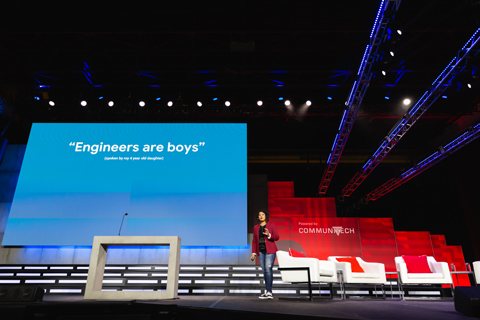
Google engineer Komal Singh discusses her children’s book, Ara the Star Engineer. (Communitech photo: Harminder Phull)
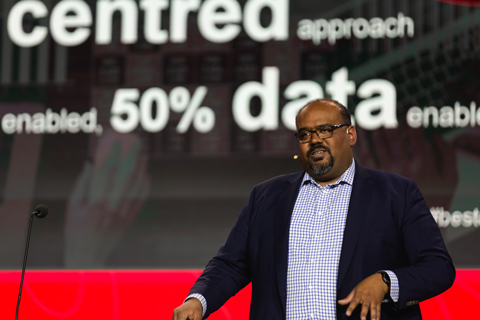
Matthew Chandy talks about Waterloo Region’s Smart Cities initiative. (Communitech photo: Harminder Phull)
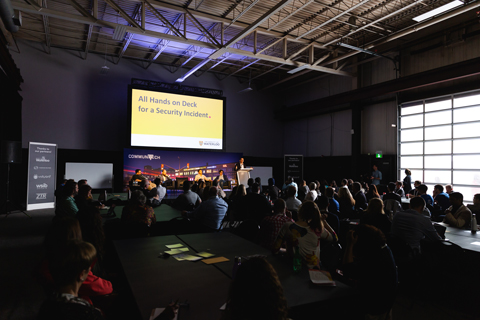
The University of Waterloo hosted a workshop titled All Hands on Deck for a Security Incident. (Communitech photo: Harminder Phull)
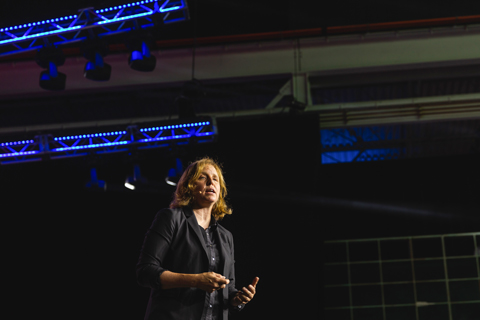
Megan Smith, former CTO of the United States. (Communitech photo: Harminder Phull)
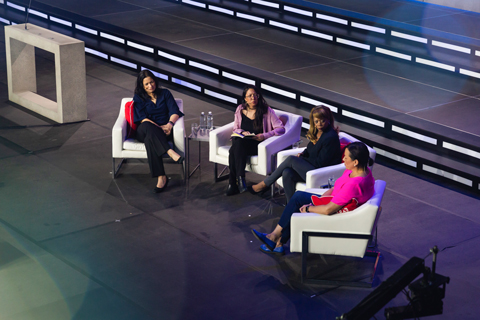
The #MeToo panel discusses sexual harassment in the workplace. (Communitech photo: Harminder Phull)
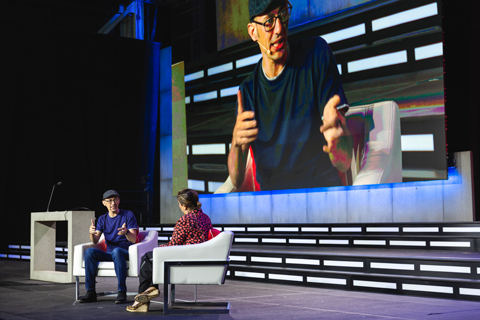
Shopify CEO Tobi Lütke in conversation with the CBC’s Rosemary Barton. (Communitech photo: Harminder Phull)

